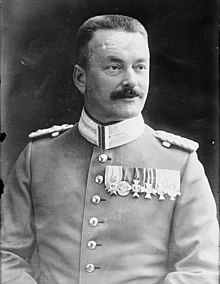Paul von Kneussl
Paul Kneußl , Knight of Kneussl since 1913 , (born June 27, 1862 in Lindau , † February 16, 1928 in Munich ) was a Bavarian infantry general and an honorary citizen of his hometown.
Life
origin
Paul was the son of the district administrator Johann Baptist Kneussl and his wife Klara, née Vigl.
Military career
After visiting the commercial and industrial school he went to the two-year technical college and entered 1880 as a one-year volunteer in the 4th Field Artillery Regiment "King" of the Bavarian army one. He was then taken over as a capitulator in the 3rd Infantry Regiment "Prince Karl of Bavaria" and appointed Portepéefähnrich. On December 22, 1883, he was promoted to Second Lieutenant with the highest commendation .
As a prime lieutenant (since June 13, 1892) he was regimental adjutant in 1889 and graduated from the military academy from 1892 to 1895 , which gave him the qualification for the general staff, the higher adjutantage and the subject (tactics). Following this, Kneussl took over a company in the 2nd Jäger Battalion on March 17, 1897 while simultaneously being promoted to captain . In 1899 he was first transferred to the General Staff of the II. Army Corps and in 1900 to the III. Army Corps . Here he was promoted to major on September 21, 1904, and on October 17, 1905, he was appointed battalion commander in the infantry body regiment . Then he was transferred to the Central Staff of the General Staff on December 12, 1906 and promoted to Lieutenant Colonel on September 11, 1907 . On December 30, 1907, Kneussl was appointed director of the War Academy for two years and on December 19, 1909 he was appointed chief of the General Staff of the III. Army Corps in Nuremberg . After his promotion to colonel , he took over the 3rd Infantry Regiment on October 15, 1910. At the beginning of 1912 he was transferred as head of department in the War Ministry and appointed to the Ordinary State Council.
After his promotion to major general on January 23, 1913, Kneussl received the Knight's Cross of the Order of Merit of the Bavarian Crown from the hands of his king . Associated with this was the elevation into the personal nobility and from this point on he was allowed to call himself "Knight of Kneussl".
He took over the 8th Infantry Brigade in Metz and when the First World War broke out, he was given command of the 1st Reserve Infantry Brigade , with which he was deployed in northern France. Then Kneussl was entrusted from March 25, 1915 with the leadership of the newly established 11th Division and promoted him on May 19, 1915 to lieutenant general . At the beginning of June 1915, the 11th Division under his command played a key role in the recapture of the Przemyśl Fortress . For this achievement Colonel-General Kneussl was awarded the Order of the Iron Crown 1st Class with War Decoration together with Field Marshal Lieutenant Martiny .
From March to May 1916 his division was used in the battle of Verdun , then between July and October 1916 in the Brusilov offensive in the Kovel area . His troops proved themselves in the mountain war in the Romanian theater of war and intervened in the battle of the Argesch (December 1916) on the advance on Bucharest . In April 1917, Kneussl's division fought in the defense against French attacks in the Battle of the Aisne and were then used in the final phase of the Third Battle of Flanders near Passchendaele . Still standing in Flanders in the last year of the war, his troops were involved in the attack on Kemmelberg in April 1918 . Shortly before the end of the war, in August 1918, he was appointed Commanding General of the XV. Reserve Corps that he led back home after the Armistice of Compiègne .
Kneussl was retired from the army on August 18, 1919 while being promoted to General of the Infantry.
The University of Erlangen awarded him an honorary doctorate on May 20, 1925 . In 1937 a Wehrmacht barracks in Augsburg was named after him, the General Kneussl Infantry Barracks .
Awards
- Cross of Honor of the Order of Merit of St. Michael
- Iron Cross (1914) 2nd and 1st class
-
Pour le Mérite with oak leaves
- Pour le Mérite on June 3, 1915
- Oak leaves on January 11, 1917
- Order of the Red Eagle II class with swords on June 12, 1915
- Knight's Cross of the Military Max Joseph Order on June 3, 1915
- Commander's Cross of the Military Max Joseph Order on October 8, 1915
- Bavarian Order of Military Merit 2nd class with crown and swords on August 4, 1918
- Commander first class of the Order of Frederick on April 5, 1917
literature
- Othmar Hackl : The Bavarian War Academy (1867-1914). CH Beck´sche Verlagsbuchhandlung, Munich 1989, ISBN 3-406-10490-8 , pp. 493–494.
- Rudolf von Kramer, Otto Freiherr von Waldenfels: VIRTUTI PRO PATRIA. The Royal Bavarian Military Max Joseph Order. Acts of War and Book of Honor 1914-1918. Self-published by the Royal Bavarian Military Max Joseph Order, Munich 1966, pp. 335–338.
Individual evidence
- ↑ Othmar Hackl: The Bavarian War Academy (1867-1914). CH Beck´sche publishing house bookstore. Munich 1989. ISBN 3-406-10490-8 . P. 493.
| personal data | |
|---|---|
| SURNAME | Kneussl, Paul von |
| ALTERNATIVE NAMES | Kneussl, Paul Ritter von; Kneussel, Paul |
| BRIEF DESCRIPTION | Bavarian General of the Infantry and Council of State |
| DATE OF BIRTH | June 27, 1862 |
| PLACE OF BIRTH | Lindau |
| DATE OF DEATH | February 16, 1928 |
| Place of death | Munich |
